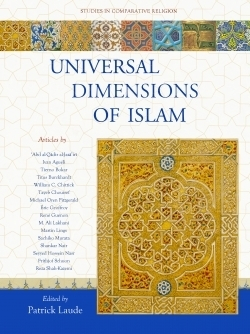Universal Dimensions of Islam
Studies in Comparative Religion
- 2011 INDIES Finalist
- Finalist, Religion (Adult Nonfiction)
In Universal Dimensions of Islam Editor Patrick Laude compiles sixteen scholarly articles on the aspects of Islam that matter most to a Western audience in today’s particularly tense political climate. Ideas of universality, Islam’s perspective on other faiths, interfaith dialogues, the role of love in the Qur’an, and detailed explorations of Sufism make up a significant portion of the collection, along with a smattering of unique but absorbing studies of Qur’anic ideals and linguistic meditations. Though aimed at a scholarly audience, this collection pricks at the root of Western discomfort with Islam—a faith that is seemingly foreign and incompatible with Western ideals.
The spirit of the collection is perhaps what is most impressive. A central goal of the journal—and by extension this collection—is to underline the common threads stitched through the vast array of religious paths. Laude’s careful selection of articles points to a desire to provide readers with a clear and accurate understanding of Islam’s system of belief and how it coincides and even upholds the truths held sacred by other faiths. Furthermore, Laude is focused on presenting a collection that shows through individual studies how Islam is “intrinsically equipped to address universal human predicaments.” He stresses, and the essays in his book support, the fundamental belief of Oneness and Unity as a central factor in interpreting the universal appeal of Islam.
Michael Oren Fitzgerald’s essay, The Universal Foundations of Islam, offers readers a study of how Islam views other faiths. Through a close study of the main sources of Islamic beliefs (The Qur’an and Hadith), Fitzgerald shows how other faiths (particularly Christianity and Judaism), despite their differences, are recognized, validated, and in many ways hold the same fundamental beliefs of origin and Prophethood. This element of continuity—that the same unifying message has been sent (and re-sent) through various faiths, including Islam—reverberates through the other essays, with both unity and continuity stressed as important factors in recognizing Islam as a force of change in the modern world.
The book places heavy emphasis on Sufism—in many ways the most attractive and accessible strand of Islamic studies for Westerners. Its mystic ideals of journey towards spiritual climax and the individual struggle of the heart toward unity and spiritual calm are discussed at length and aim to display the accessible nature of Islam’s take on personal religious paths. The collection also offers unique meditations on themes of love and linguistics (William Chittick’s The Koran as the Lover’s Mirror and Rene Guenon’s enigmatic Mysteries of the Letter Nun) offer a dose of this absorbing style of study. This variety of content further emphasizes the goal of expressing Islam as a faith with universal dimensions.
Perhaps it also reflects the general movement away from studies that focus only on orthodox practices and instead places emphasis on interpretations that reveal new perspectives. It favours an approach that explores both traditional and alternative forms of Islam (and other faiths) through the lens of personal experience while utilizing the power of academic distance.
Eclectic and a testament to the highest caliber of research and writing, Universal Dimensions of Islam will appeal to scholarly audiences in the fields of comparative religion, politics, and interfaith studies.
Reviewed by
Shoilee Khan
Disclosure: This article is not an endorsement, but a review. The publisher of this book provided free copies of the book and paid a small fee to have their book reviewed by a professional reviewer. Foreword Reviews and Clarion Reviews make no guarantee that the publisher will receive a positive review. Foreword Magazine, Inc. is disclosing this in accordance with the Federal Trade Commission’s 16 CFR, Part 255.

